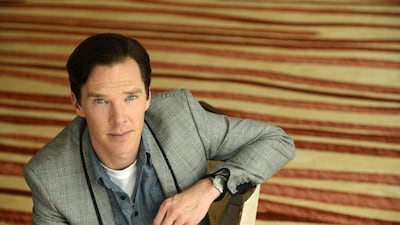It’s unquestionably the most topical film of the year. Bill Condon’s The Fifth Estate, the story of Julian Assange and WikiLeaks, arrives at a time when the controversial Australian and his whistle-blowing website are rarely far from the headlines. “It’s a very present phenomenon,” says Daniel Brühl, one of the film’s stars. “There’s always something going on in the world related to WikiLeaks.”
So much so, it’s almost impossible for Condon’s film to keep up. This year alone, there’s been the site’s support for the ex-CIA employee Edward Snowden, who disclosed classified details of several top-secret US and British mass surveillance programmes. Then there was the fate of Bradley Manning, who was sentenced to 35 years in prison in July for mailing 250,000 diplomatic US cables to WikiLeaks.
The film details this alongside Assange’s fractured relationship with his German colleague Daniel Domscheit-Berg (Brühl). Playing the white-haired Assange is the 37-year-old British actor Benedict Cumberbatch.
“I’m thrilled with it,” he says. “I think Bill has made a beautiful film; it’s incredibly balanced. It’s entertaining as well as intriguing. And what it should do is ignite a debate – hopefully it will do that.”
Whether it will remains to be seen; the film has not fared well in America – the US$26 million (Dh95m) project taking just $1.7m from 1,769 cinemas, making it the worst debut for a film opening on more than 1,500 screens this year. As if to rub salt into the wound, WikiLeaks simultaneously released, online, Mediastan, a documentary about a group of the website’s associates travelling through Central Asia, seeking newspaper editors to publish sensitive cables. Mediastan has already had more than 50,000 views.
It shows that Assange – who produced it with Ken Loach’s Sixteen Films – is still very much in command, despite being holed up in the Ecuadorean embassy in London after he fled there to avoid extradition to Sweden, where he faces allegations of sex crimes against two women.
He was particularly vocal about The Fifth Estate, after he secured an early draft of the script. During an address he gave, via video streaming, to the Oxford Union, he called it “a mass propaganda against WikiLeaks, the organisation and the character of my staff and our activities”.
Speaking in January, he added that it “fans the flames to start a war with Iran”, a comment made in reaction to the original opening scene which was set in a military complex in Tehran, with a close-up on a file detailing plans for making a nuclear bomb.
“That’s not in the script now,” says The Fifth Estate co-star David Thewlis, who plays Nick Davies, the British journalist involved in publishing Manning’s leaks. “So he [Assange] did have a say.”
Assange also had plenty to say to Cumberbatch after sending him a long email pleading for him to withdraw from the project. The actor replied, promising it wouldn’t be a negative portrayal; he didn’t want to “get into a slagging match about whether he [Assange] was good or bad”, he says. Still, it’s clear Cumberbatch was influenced by these email exchanges. “I think he’s probably turned the film around,” says Thewlis. “I think he became more sympathetic to Julian as the film went on.”
With the script adapted from Domscheit-Berg’s book Inside WikiLeaks and a separate account by the journalists David Leigh and Luke Harding, Brühl believes numerous stories could have been told about Assange and his website. “There are so many different versions of what happened. There are always different points of view.” But one thing is certain, he says. “It’s not an anti-WikiLeaks, anti-Assange film. I think the villains in the movie are banks, governments and armies – but not him.”
• The Fifth Estate is out now in UAE cinemas
artslife@thenational.ae

